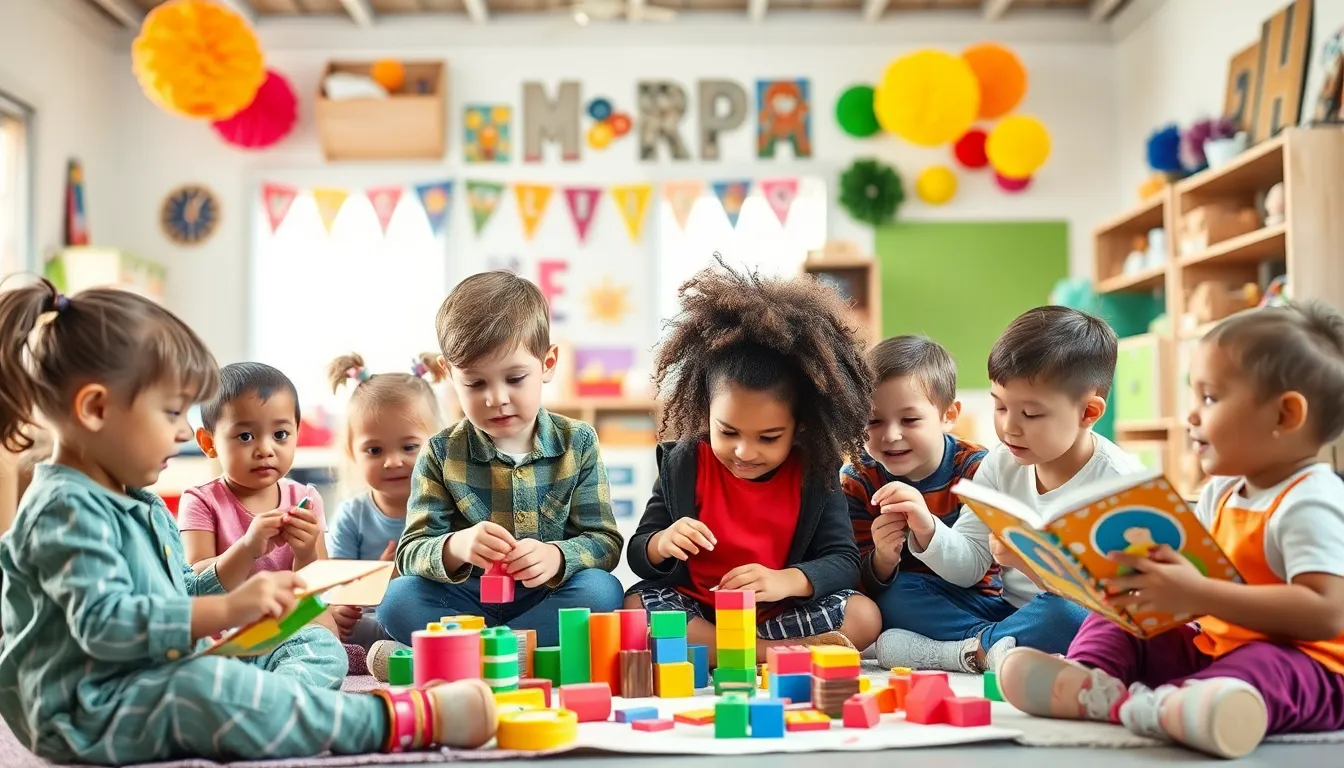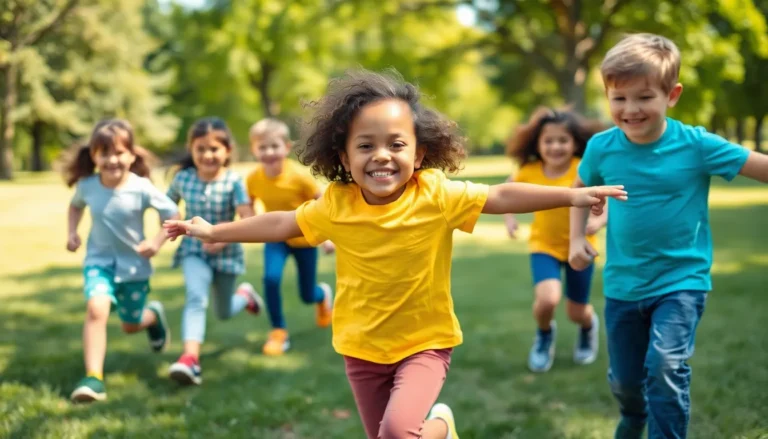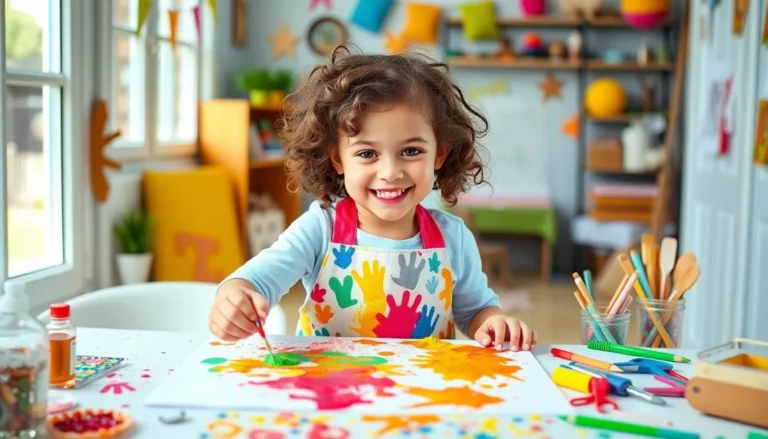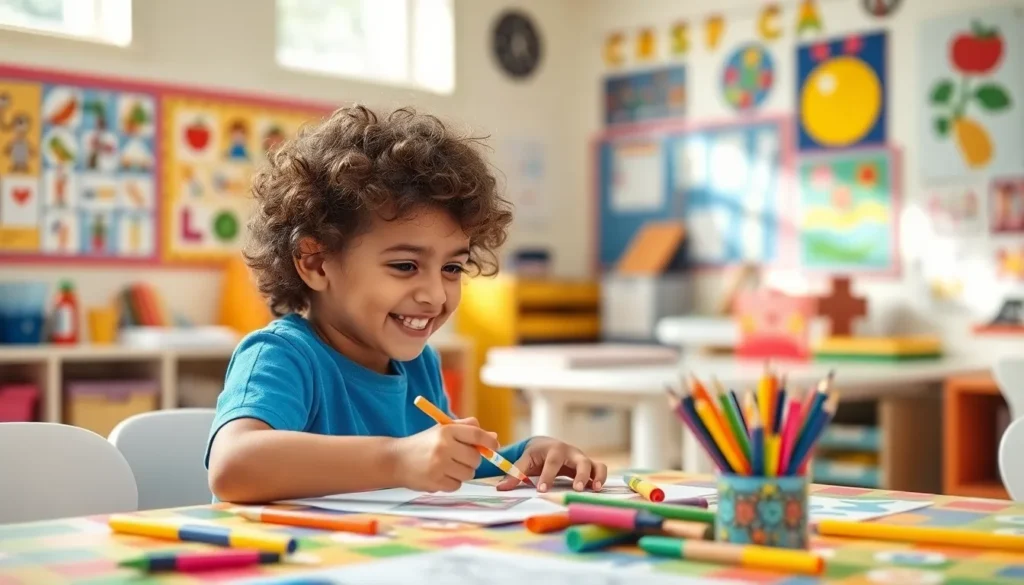Table of Contents
TogglePreschoolers are full of energy and curiosity, making it essential to provide them with engaging activities that spark their imagination. Fun activities not only entertain but also foster essential skills like creativity, motor development, and social interaction. Parents and educators alike can benefit from a treasure trove of ideas that transform playtime into valuable learning experiences.
From arts and crafts to simple science experiments, the right activities can captivate young minds and keep them active. By incorporating play into their daily routines, caregivers can create an environment where preschoolers thrive. Discovering the perfect blend of fun and education is key to nurturing a love for learning that lasts a lifetime.
Importance Of Fun Activities For Preschoolers
Fun activities play a crucial role in the development of preschoolers. Engaging in these activities enhances creativity, fosters motor skills, and promotes social interaction.
- Skill Development
Fun activities contribute to essential skill development in preschoolers. They support fine motor skills through activities like drawing, cutting, and pasting. Gross motor skills improve with movement-based games and outdoor play.
- Cognitive Growth
Preschoolers benefit cognitively from fun experiences. Activities like puzzles and matching games enhance problem-solving abilities. They encourage critical thinking and boost memory retention.
- Social Skills
Participating in group activities strengthens social skills. Preschoolers learn to take turns, share, and communicate with peers. Cooperative play nurtures teamwork and conflict resolution skills.
- Emotional Well-Being
Fun activities promote emotional development. They allow preschoolers to express themselves creatively, which can build confidence. Engaging in playful scenarios reduces stress and fosters a positive attitude towards learning.
- Lifelong Learning
Fun activities instill a love for learning early on. When preschoolers associate learning with enjoyable experiences, they’re more likely to continue seeking knowledge. Cultivating curiosity during these formative years sets a foundation for future academic success.
Integrating fun activities into the daily routine of preschoolers significantly supports their overall growth. These experiences enrich children’s lives, laying a vibrant foundation for their development.
Types Of Fun Activities

Engaging preschoolers in various activities enhances their development and learning. Below are types of fun activities that keep them entertained and foster essential skills.
Indoor Activities
- Arts and Crafts: Provides an outlet for creativity, using materials like colored paper, paints, and clay, allowing preschoolers to explore colors and textures.
- Storytime Sessions: Enhances language skills, comprehension, and imagination by reading engaging books that encourage participation and discussion.
- Building Blocks: Stimulates motor skills and spatial awareness, promoting creativity and problem-solving as children construct different structures.
- Interactive Games: Fosters social interaction, communication, and teamwork through games that require sharing, cooperation, and turn-taking.
- Simple Science Experiments: Encourages curiosity and critical thinking, using safe materials like baking soda and vinegar to create fun reactions and learn basic science concepts.
Outdoor Activities
- Nature Walks: Promotes physical fitness and observational skills, allowing preschoolers to explore the environment and learn about plants, animals, and habitats.
- Playground Fun: Enhances gross motor skills through climbing, sliding, and swinging, offering opportunities for children to challenge themselves physically.
- Gardening Activities: Teaches responsibility and patience, as preschoolers plant seeds, water them, and observe their growth.
- Outdoor Games: Encourages group play and social skills through activities like tag, hide-and-seek, and relay races, promoting teamwork and friendly competition.
- Art in Nature: Combines creativity with outdoor exploration, using natural materials such as leaves and stones to create unique artwork.
Educational Activities
- Puzzle Building: Improves problem-solving skills and hand-eye coordination, offering engaging challenges of varying complexity tailored to preschoolers’ abilities.
- Counting Games: Strengthens numerical skills through fun activities like counting objects, playing with blocks, or engaging in rhythm games that involve clapping or jumping.
- Alphabet Activities: Facilitates literacy development, using flashcards or games that help children recognize letters and associate them with sounds and words.
- Matching Games: Enhances memory and cognitive skills, utilizing cards or objects that promote recognition and recall of similar items.
- Basic Cooking Activities: Teaches measurement and following instructions, allowing preschoolers to participate in safe cooking tasks like mixing ingredients for a simple recipe.
Benefits Of Engaging In Fun Activities
Engaging in fun activities offers multiple benefits for preschoolers, enhancing their overall development. These activities support social skills, cognitive growth, and physical health.
Social Skills Development
Social skills development occurs through group activities. Preschoolers learn to take turns during games and share materials during arts and crafts. They practice effective communication by expressing ideas and feelings with peers. Fun activities encourage cooperation and teamwork, fostering empathetic relationships among young children. By participating in group settings, preschoolers build a foundation for forming friendships and developing interpersonal skills.
Cognitive Growth
Cognitive growth thrives through engaging activities that challenge young minds. Puzzles, matching games, and simple science experiments stimulate problem-solving and critical thinking abilities. Fun activities enhance language skills by introducing new vocabulary through storytelling and interactive discussions. Engaging in educational tasks like counting games and organized play promotes memory retention and cognitive flexibility. Overall, these experiences cultivate a curiosity for learning and encourage exploration.
Physical Health
Physical health benefits significantly from active play and movement-based activities. Motor skills improve through activities like dance, climbing at playgrounds, and running games. Engaging in arts and crafts enhances fine motor skills, such as hand-eye coordination and dexterity. Outdoor play encourages physical fitness while promoting an appreciation for nature. Overall, fun activities contribute to a healthy lifestyle by establishing habits that can carry into adulthood.
Tips For Choosing The Right Activities
Choosing the right activities for preschoolers involves considering several key factors to ensure enjoyment and educational value. Caregivers should focus on age appropriateness and children’s interests to create engaging experiences.
Age Appropriateness
Selecting age-appropriate activities supports preschoolers’ developmental milestones. Activities must match their motor skills, attention spans, and cognitive abilities.
- Tailored Challenges: Choose activities that are neither too simple nor too complex, promoting successful experiences without causing frustration.
- Developmental Stages: Activities like building blocks for fine motor skills or simple puzzles for cognitive growth align with specific age ranges.
- Safety Considerations: Prioritize safety by avoiding materials that pose choking hazards or sharp objects unsuitable for young children.
Interest-Based Selection
Identifying interests significantly enhances engagement. Children are more likely to participate when activities resonate with their preferences.
- Incorporating Favorites: Engage preschoolers by including themes or characters from their favorite books or shows.
- Observation of Play: Observe children’s play patterns to uncover their preferences, from artistic endeavors to physical activities.
- Encouraging Exploration: Allow flexibility in activity choices, giving children opportunities to try various options and discover new interests.
Engaging preschoolers in fun activities is vital for their growth and development. These experiences not only entertain but also cultivate essential skills that shape their future. By providing a mix of indoor and outdoor activities tailored to children’s interests, caregivers can create an enriching environment that promotes learning through play.
Encouraging creativity and social interaction helps build confidence and emotional well-being. As preschoolers explore various activities, they develop critical thinking and problem-solving abilities that will serve them well in their academic journeys. Prioritizing age-appropriate and safe activities ensures children enjoy their time while learning valuable lessons. Ultimately, fostering a love for learning at this young age lays the groundwork for a bright and successful future.







